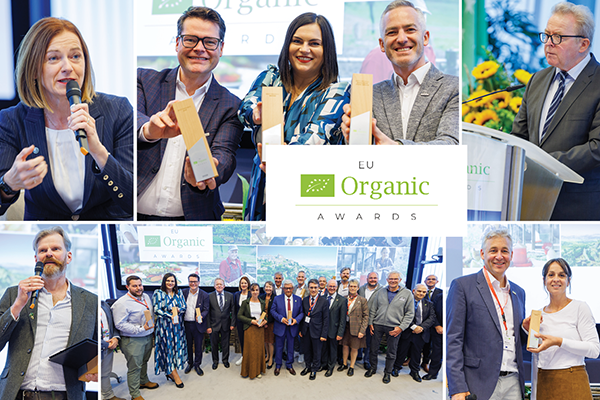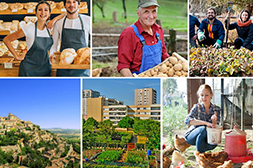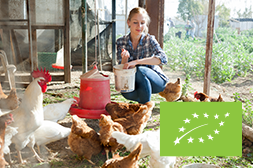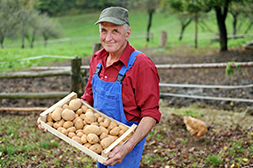The EU organic awards were launched as a yearly celebration to acknowledge excellence in the organic value chain. They are presented on or around EU organic day on 23 September.
Watch the full recording of the third EU organic awards ceremony that took place in Brussels on 23 September 2024.

Meet the winners
The EU organic awards comprise 8 awards across 7 different categories. They acknowledge different actors along the organic value chain that have developed an excellent, innovative, sustainable, and inspiring project producing real added value for organic production and consumption. These awards are non-financial.
The third awards ceremony was organised on 23 September 2024, as one of a range of activities and events to mark EU organic day. The winners were invited to an event in Brussels to collect their awards. This event involved representatives of the European Commission, the European Parliament, the Council of the European Union, the European Economic and Social Committee, the Committee of the Regions, COPA-COGECA and IFOAM Organics Europe. Providing examples of best practices, the winners were able to explain their project to a broader public.
Reinhild Frech-Emmelmann, Reinsaat GmbH, St. Leonhard am Hornerwald, Lower Austria, Austria
The farm was founded in 1998. It specialises in organic, GMO-free seeds, with over 800 seed-resistant varieties, promoting biodiversity and sustainable farming across Europe. Its breeding programme focuses on sustainable development, preserving biodiversity and supporting gardeners worldwide. With a gene bank of 1 500 varieties and 142 registered EU varieties, the farm employs over 50 people and works with farms and cooperatives across 9 countries.
Benny Schöpf, Kartoffelkombinat, München, Bavaria, Germany
Mr Benny Schöpf is the chief vegetable grower at Kartoffelkombinat. This cooperative farm near Munich supplies 2 300 households weekly with organic vegetables. The farm has 40 permanent employees, and prioritises fair working conditions and sustainable practices. It aims to offer members affordable, fairly produced organic food without harming the environment. As the largest community-supported cooperative farm in Germany, they promote an alternative agricultural economic system.
South Savo, Finland
This southeastern region of Finland has built a strong organic farming culture through 40 years of collaboration between farmers, researchers, and local authorities. The region has now 200 organic farmers, with local organisations playing a crucial role in promoting organic farming practices. The region's preserved natural environment demonstrates organic farming's role in protecting water quality and biodiversity, fostering positive consumer attitudes. The region established the Finnish Organic Research Institute as well as a network of organic farmers.
Category 3: Best organic city
The objective of this award is to reward a city. This award is organised byEuropean Committee of the Regions.
BioStadt Bremen, Germany
BioStadt Bremen is working towards converting all municipal catering in schools, crèches, and hospitals to 100% organic by 2025. With over 30% of farms certified organic, the city promotes sustainable food systems through community projects and innovative farming initiatives, empowering citizens to drive local change. Through 20 small-scale community projects, Bremen shows how to be a model for sustainable development with limited resources.
Sörmland Bio-district, Sörmland, Sweden
Located south of Stockholm, the district covers 2 regions and 21 municipalities. Sörmland has been a pioneer in organic farming since the 1940s, bringing together farms, food processors, restaurants, and more. With 20% of its farmland organic, the district promotes local organic products, sustainable tourism, and awareness of organic food’s health benefits.
Gino Girolomoni Cooperativa Agricola, Isola del Piano, Montebello, Marche, Italy
Located in the Marche region, this cooperative specialises in organic pasta production, continuing the mission of its founder, Gino Girolomoni. With 80 hectares of organic farmland and renewable energy-powered facilities, it produces 9 million tons of pasta annually, supporting over 300 farmers and 60 local workers. The cooperative created also an "ecosystem" that includes a cultural foundation, hospitality services and educational initiatives.
Category 6: Best organic food retailer
The objective of this award is to reward an SME food retailer selling organic products. This award is organised by the European Economic and Social Committee.
SAiFRESC, Catarroja, Valencian Community, Spain
Founded by three farmers in 2011, SAiFRESC transitioned to organic farming, revitalising agriculture in the Huerta de Valencia. With 30 hectares of organic land, they produce 70 organic products, selling 90% of their harvest locally and reducing packaging. The initiative promotes a circular economy and provides educational workshops on organic farming.
Category 7: Best organic restaurant/food service
The objective of this award is to reward an SME restaurant/food service restaurant (standalone or part of a hotel) and/or food service (caterer or canteen) proposing organic certified references in their menu. This award is organised by the European Economic and Social Committee.
Kalf & Hansen, Stockholm, Sweden
This restaurant chain serves 100% organic and seasonal Nordic cuisine. Founded in 2014 by father and son Rune and Fabian Kalf-Hansen, it operates two restaurants, catering services and provides organic meals on Swedish railway company trains. Kalf & Hansen prioritise local sourcing, sustainability, and affordable organic meals, building strong relationships with local producers.

- News article
The Commission announced today the eight winners of the third edition of the EU Organic Awards.
Applications
Application process
The process and selection criteria for the 2024 edition were supported by the following rules.
Reasons to apply
Do you want to contribute to the greater public awareness of organic production in the EU? Do you want to contribute to the greater affordability and/or accessibility of organic products in the EU? Have you developed and implemented, or are you still implementing, an excellent, innovative, sustainable and replicable project for this purpose? Would you like to increase public awareness of the project?
If the answer to any of the above questions is 'yes', you should consider entering for the next edition of the EU organic awards. If you win, you will receive a non-financial recognition award and greater public visibility for your project. So whether you are:
- an organic farmer
- a city or region serving organic meals to patients or pupils or otherwise promoting organic production
- a business in the organic food chain with a unique approach
- you should think about entering the EU organic awards.
Any actor or institution along the organic value chain with a noteworthy project contributing to the greater affordability and/or accessibility of organic products in the EU can apply. Project promoters must be established or residents in the EU. Applications must be submitted in one of the official EU languages and the projects EU based.
Applications for the EU Organic Awards had to meet the following eligibility criteria:
a) The starting point to apply for one of the awards was the EU organic awards webpage, which linked to the online application forms for each of the awards during the required period. Applications had to be submitted by 12 May 2024, 23:59:59 CEST at the latest.
Only complete applications (all sections filled in) submitted via the online platform by the deadline will be considered once the application period closes.
b) Applications had to be in one of the official EU languages.
c) Applicants had to be legal or natural persons established or resident in one of the 27 Member States of the EU.
d) The project submitted had to be EU based and refer clearly to one of the 7 award categories/8 awards. The same project could not be submitted for several award categories/awards. Each applicant could only apply for one single award. The maximum number of applications per award is one.
e) The winners of the previous editions could not re-apply for the 2024 edition. The non-winning finalists of the previous editions could re-apply for the 2024 edition.
f) The project was required to either have been fully implemented already or be in a sufficiently mature state so as to enable the jury to assess it (i.e. physical implementation had to be advanced enough to demonstrate the achievement of the objectives).
g) Specific eligibility criteria for each award category:
- Best organic farmer (female) and Best organic farmer (male): Certified accordingly to the Regulation (EU) 2018/848 of 30 May 2018 on organic production and labelling of organic products and repealing Council Regulation (EC) No 834/2007;
- Best organic region: No specific eligibility criteria;
- Best organic city: No specific eligibility criteria; in case the city operates one or more organic farms or stores, proof of their organic certification must be provided. This proof must be a valid certificate at the moment of submission;
- Best organic "bio-district": A “bio-district” is defined as a geographical area where farmers, the public, tourist operators, associations and public authorities enter into an agreement for the sustainable management of local resources, based on organic principles and practices;
- Best organic food processing SME: Enterprise certified according to Regulation (EU) 2018/848, and having 100% organic production and complying with the SME definition (an enterprise employing fewer than 250 persons, with an annual turnover not exceeding EUR 50 million, and /or an annual balance sheet total not exceeding EUR 43 million). Cooperatives can be understood as enterprises. Processing is understood as defined by Regulation (EU) No 852/2004;
- Best organic food retailers: Enterprise certified according to Regulation (EU) 2018/848 and having 100% organic certified references on sale (excluding non-food products or food products for which there is no organic availability) and complying with the SME definition (an enterprise employing fewer than 250 persons, with an annual turnover not exceeding EUR 50 million, and/or an annual balance sheet total not exceeding EUR 43 million). Cooperatives can be understood as enterprises;
- Best organic restaurant/food service: Enterprise having 100% organic certified references in their menu, where possible and complying with the SME definition (an enterprise that employs fewer than 250 persons, with has an annual turnover not exceeding EUR 50 million, and/or an annual balance sheet total not exceeding EUR 43 million). Cooperatives can be understood as enterprises.
All eligible applications will be assessed by the EU Organic Awards jury against the following horizontal award criteria:
- Excellence: The awardee must have developed an excellent initiative producing real added value for organic production. This meant good results and impact of the project in relation to its initial objectives. Projects shall demonstrate their impact on the area and territory concerned and show their results against the initially set targets and objectives.
- Innovative character of the project in the selected award category: Projects shall not be "business as usual", but should demonstrate new approaches, new organisational methods, or the development of new (or significantly) improved results for organics. The criteria for measuring the innovative character for each category are more detailed in the dedicated section of the category.
- Sustainability pillars (environmental, social and economic) of the project: Projects shall demonstrate their sustainability and their future as a self-standing initiative, or how they met each pillar of sustainability in 3 different sub-sections.
- Transferability and possibility to replicate the project elsewhere in the EU: The project shall demonstrate that it represents good practice in a wider (EU) context and that it inspires or could inspire other places. The project should also show good ways of communicating its goals and results.
The applicants were asked to answer guiding questions, developed in relation to the four principles of organic agriculture and the sustainability pillars, as well as a project summary. These questions helped the applicants to better structure their statements and the jury to obtain more data about the applicants.
Timeline
- 4 March 2024
Launch of the application period for the awards
- 12 May 2024
Deadline for the submission of applications: 12 May 2024, 23:59:59 CEST.
- June/July 2024
Awards evaluation decision
- 23 September 2024
Awards ceremony
About the EU organic awards
Increases in organic production contribute significantly to reducing the use of chemical fertilisers, pesticides and antimicrobials and have positive effects on our climate, the environment, biodiversity and animal welfare. That is why organic production has been identified as playing a key role in achieving the objectives of the European Green Deal, the Farm to Fork strategy and the Biodiversity strategy. For this reason, the Commission has defined a target of 25% of EU agricultural land under organic farming by 2030 and a significant increase in organic aquaculture.
The Commission has adopted the Action Plan for the Development of Organic Production in March 2021, including the launch of annual awards. They aim to reward the best and most innovative organic actors, contributing to the reduction of agriculture’s impact on the environment and climate.
The inaugural EU organic awards ceremony took place in Brussels on 23 September 2022. Meet the winners of the 2022 and 2023 editions.
Organisers
The EU organic awards are jointly organised by the European Commission, the European Economic and Social Committee, the European Committee of the Region, COPA-COGECA and IFOAM Organics Europe.
The jury deciding on the final winners comprised representatives of:
- The European Commission,
- The European Economic and Social Committee,
- The European Committee of the Regions,
- COPA-COGECA,
- IFOAM Organics Europe,
- The European Parliament and
- The Council of the European Union.
Organic farming, aquaculture and food in the EU
Regulation (EU) 2018/848 states in recital 1 that “Organic production is an overall system of farm management and food production that combines best environmental and climate action practices, a high level of biodiversity, the preservation of natural resources and the application of high animal welfare standards and high production standards in line with the demand of a growing number of consumers for products produced using natural substances and processes”.
Organic production is increasing in the EU. In 2019, 8.5% of EU agricultural land was under organic farming. This equalled 13.8 million hectares, up from 9.5 million hectares in 2012, a 45.8% increase. The countries accounting for most of the EU agricultural land under organic farming were Spain (2.4 billion hectares, 17.4% of the EU total), France (2.2 billion hectares, 16.2% of the EU total), Italy (2.0 billion hectares, 14.5% of the total) and Germany (1.3 billion hectares, 9.4% of the EU total) as per Eurostat organic farming statistics.
Across the entire value chain, almost 344,000 organic producers and over 78,000 organic processors were active in the EU. Organic farmers benefit from the price premiums that organic products fetch on the market and the rapidly growing final consumer demand for organic products. In 2019, the EU market accounted for 38.8 billion euro in a global market of 106.4 billion euro, second after the US market accounting for 48.2 billion. Large markets in the EU are Germany (12.0 billion) euro and France (11.3 billion euro), as per FIBL statistics.
Per capita consumer expenditure on organic products is highest in Denmark (344 euro, equivalent to 12% of grocery shopping) and Luxembourg (264 euro, equivalent to 8% of grocery shopping), as per FIBL statistics.
Consumer awareness of the EU organic logo is increasing. In 2020, 56% of Eurobarometer survey respondents recognised the logo, compared to 27% in 2017. 80% of survey respondents believe that organic products are more environmentally friendly and respect higher animal welfare standards.
Food for Europe podcast episodes
A selection of the Food for Europe podcast episodes are dedicated to organic farming in the EU, as well as the launch of the EU organic awards in 2022 and the 2023 awards ceremony. All the episodes of the "Food for Europe" podcast are released in English, French and German.
 Celebrating the best of organic farming and food
Celebrating the best of organic farming and food29 September 2023
 EU Organic Awards
EU Organic Awards24 March 2022
 EU organic action plan – what's on the plate?
EU organic action plan – what's on the plate?1 April 2021
 Strengthening the EU organic label
Strengthening the EU organic label18 March 2021
 Building trust in organic farming in Europe
Building trust in organic farming in Europe11 March 2021
 Introducing organics
Introducing organics4 March 2021
Documents
- 29 JANUARY 2024
- 29 JANUARY 2024
- Downloadбългарски(267.64 KB - PDF)
- Downloadespañol(203.14 KB - PDF)
- Downloadčeština(267.15 KB - PDF)
- Downloaddansk(203.2 KB - PDF)
- DownloadDeutsch(205.63 KB - PDF)
- Downloadeesti(245.96 KB - PDF)
- Downloadελληνικά(268.43 KB - PDF)
- Downloadfrançais(204.94 KB - PDF)
- DownloadGaeilge(209.22 KB - PDF)
- Downloadhrvatski(268.88 KB - PDF)
- Downloaditaliano(201.1 KB - PDF)
- Downloadlatviešu(267.46 KB - PDF)
- Downloadlietuvių(269.04 KB - PDF)
- Downloadmagyar(256.96 KB - PDF)
- DownloadMalti(303.62 KB - PDF)
- DownloadNederlands(201.89 KB - PDF)
- Downloadpolski(270.9 KB - PDF)
- Downloadportuguês(205.07 KB - PDF)
- Downloadromână(247.41 KB - PDF)
- Downloadslovenčina(276.85 KB - PDF)
- Downloadslovenščina(265.23 KB - PDF)
- Downloadsuomi(196.93 KB - PDF)
- Downloadsvenska(199.78 KB - PDF)
- 29 JANUARY 2024
- Downloadбългарски(276.87 KB - PDF)
- Downloadespañol(214.99 KB - PDF)
- Downloadčeština(281.52 KB - PDF)
- Downloaddansk(185.41 KB - PDF)
- DownloadDeutsch(198.56 KB - PDF)
- Downloadeesti(211.72 KB - PDF)
- Downloadελληνικά(276.92 KB - PDF)
- Downloadfrançais(215.89 KB - PDF)
- DownloadGaeilge(214.3 KB - PDF)
- Downloadhrvatski(262.09 KB - PDF)
- Downloaditaliano(211.32 KB - PDF)
- Downloadlatviešu(271.51 KB - PDF)
- Downloadlietuvių(273.39 KB - PDF)
- Downloadmagyar(295.97 KB - PDF)
- DownloadMalti(316.49 KB - PDF)
- DownloadNederlands(214.71 KB - PDF)
- Downloadpolski(282.96 KB - PDF)
- Downloadportuguês(216.06 KB - PDF)
- Downloadromână(281.57 KB - PDF)
- Downloadslovenčina(289 KB - PDF)
- Downloadslovenščina(282.48 KB - PDF)
- Downloadsuomi(186.26 KB - PDF)
- Downloadsvenska(187.82 KB - PDF)
- 28 MARCH 2023
Related links
At a glance information on EU organic policy, the organic logo and legislation relating to the organic sector, as well as frequently asked questions.
This plan aims to drive investment and innovation in organic farming and boost demand for organic food. Check out what has been achieved so far.
Information on the new organic legislation in force since January 2022, the consultation that was held about the new law and the action plan for organics.
Policy, rules, organic certifications, support and criteria for organic farming.


